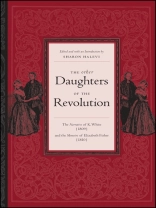Presents two of the earliest autobiographies of American women.
Early in the nineteenth century, New York residents K. White and Elizabeth Fisher wrote and published two of the earliest autobiographies written by American women. Their lives ran along parallel courses: both were daughters of Loyalists who chose to remain in the United States; both found themselves entangled in unhappy marriages, abandoned for extend periods, and forced to take on the role of sole provider; and both became involved in property disputes with their male kin, which eventually landed them in prison, where they wrote their narratives. White’s tale is a highly crafted text, almost an embryonic novel, incorporating several subgenres and interweaving poetry and prose. Fisher’s story, while less sophisticated in terms of rhetoric and style, is nevertheless a compelling account of a woman’s life and struggles during the Revolution and the early years of the republic.
Their narratives, read together, highlight many literary and historical issues. They present an unruly, disobedient, and assertive female subject and illuminate popular attitudes regarding women and marriage. By articulating a consistent and growing unease concerning the institution of marriage and the unlimited power husbands had over their wives, these narratives lay the groundwork for a political critique of marriage and the status of women within it.
Cuprins
Acknowledgments
Introduction
1. K. White, Narrative of the Life, Occurrences, Vicissitudes and Present Situation of K. White (1809)
2. Elizabeth Munro Fisher, Memoirs of Mrs. Elizabeth Fisher (1810)
Bibliography
Index
Despre autor
Sharon Halevi is Lecturer in the Department of Multi-Disciplinary Studies at the University of Haifa.












